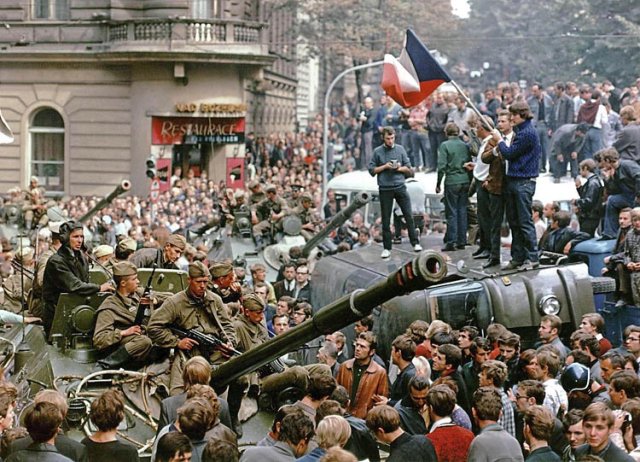
The Idea of Communism
By Tariq Ali
Seagull Press 2009, 126 pages
This short book is the first in a series called “What Was Communism”, which aims to explore the practice of Communism in the 20th century.
Tariq Ali’s main thesis is that “The failure of official Communism in the 20th century and the restoration of capitalism in Russia and China … far from negating some of the premises that underlined the project in the first place, emphasises their continuing importance”.
In essence Ali’s aim is to undermine the standard equation of revolutionary Marxism with Stalinism, on both the theoretical and practical levels.
Ali begins by outlining some of the main ideas expressed in Marxist classics, such as the 1848 Communist Manifesto, and the commentary on the Paris Commune that Marx produced in the early 1870s.
The “dictatorship of the proletariat” as embodied in the short-lived Commune was a million miles away from the undemocratic and repressive regimes that ruled Eastern Europe between the end of World War II and the collapse of the Berlin Wall in 1989.
Ali argues that Stalinism was not a pre-ordained consequence of the attempt to put Marxism into practice, but a consequence of the fact that the first socialist revolution occurred in such a backward and isolated setting as Russia in 1917.
Moreover, the ossified and sterile “orthodox Marxism” that dominated the countries in which “actually existing socialism” held sway was totally at odds with the self-criticism to which Marx and Engels subjected themselves: “They would have been horrified by the suggestion that their writings would one day be elevated to the status of a religion”.
As Ali himself is keen to make clear, none of this is particularly original, but it is necessary to restate it because it has been largely forgotten.
However, even for those who know the basics of the main lines of classical Trotskyist thought, there are some stimulating issues broached in Ali’s book, such as post WWII Czechoslovakia.
Ali points out that unlike much of the rest of Eastern Europe, Czechoslovakia had an economy that was more developed than that of the USSR itself. Communists were in the forefront of the anti-fascist resistance, and “were largely based on the strong traditions of the working class”.
Ali quotes the words of French philosopher Jean Paul Sartre: “Czechoslovakia could have been the first power to accomplish a successful transition from an advanced capitalist economy to a socialist economy, offering the proletariat of the West, if not a model, at least an embodiment of its own revolutionary future.”
Yet the revolutionary potential of the Czech communists was snuffed out by “the horse-medicine of the Soviet bureaucracy”.
Although Ali succeeds in rescuing Marxism from Stalinism, he perhaps overplays the role of Stalinism in killing off the prospects of working-class revolution in the capitalist West.
He says that the capitalist order in the West “triumphed largely because of the bureaucratic despotisms that led to the besmirching of socialism in the former Soviet Union”.
There is an element of truth in this, of course. But it neglects the fact that the isolation that led to the triumph of Stalin’s bureaucratic despotism in the Soviet Union was itself a consequence of the failure of mass socialist parties in Europe, most especially in August 1914, when the parties of the Second International gave up their previous anti-war stance in favour of aiding the war effort of their respective national ruling classes.
This, and not the bureaucratic despotism that gained the ascendancy in the Soviet Union in the 1920s, is the key to understanding the sad fact that revolutions did not eventuate in the West.
Ali perhaps misses this because he doesn’t pay due heed to the influence of Marxist ideas on the European working-class prior to the Russian Revolution. He writes: “Until then, these had largely been the preserve, with a few exceptions, of a miniscule stratum of intellectuals and workers in Europe”.
That may be true of Britain, but it is certainly false of Germany: far from being miniscule, the German Social Democratic Party was massive, commanding the active support of millions of German workers.
It also had a Marxist program, and included in its membership some of the most prominent Marxist theorists of the day.
And yet, with a few exceptions such as Karl Leibknecht and Rosa Luxemburg, it capitulated completely in 1914. How did this happen, and what can the left in advanced capitalist countries learn from it? This question doesn’t get asked in the book.
That criticism aside, this is an excellent book that should be read by many. It is inspiring to read Ali staunchly refusing to join the multitude of Marxist and left-wing writers and intellectuals who have jumped ship in recent years.
The volume is very handsomely produced, and it was delightful to discover a tear-out poster of Bertolt Brecht’s poem “In Praise of Communism” stitched into the endpiece.
As Ali says, Marx’s ideas can never be consigned to oblivion, because: “the great task remains. A moneyed aristocracy rules large parts of the world via tame politicians of every hue. The duels between the possessors and the dispossessed continue, taking new forms. The mistakes of the 20th century have to be learnt and transcended. Capitalism has failed to do so. Socialists must”.
Comments
Anonymous replied on Permalink
Anonymous replied on Permalink
Anonymous replied on Permalink
Anonymous replied on Permalink
Anonymous replied on Permalink